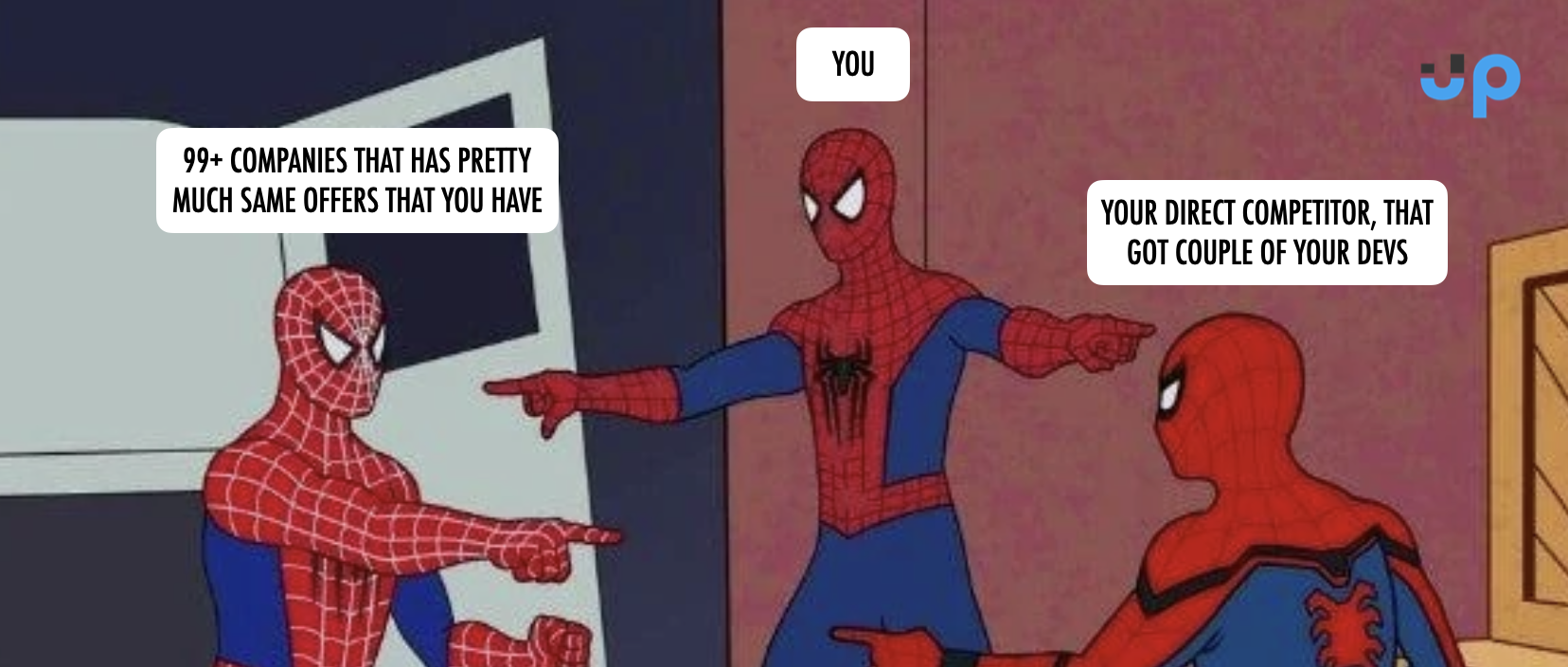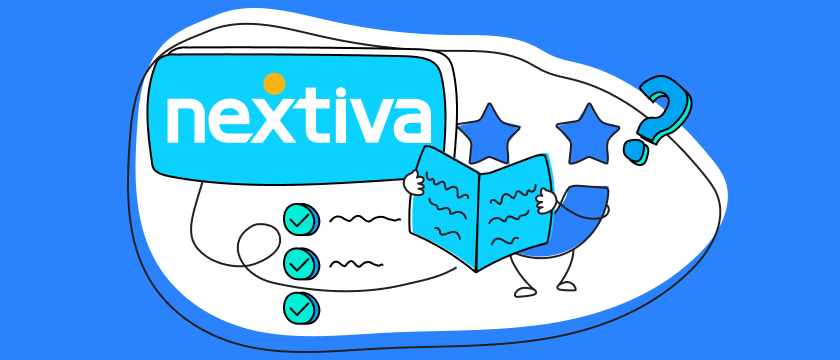The Rules of the Recruiting Game in 2022
A good article could start with a story. So let`s try one. How about discovering a tale of an IT outsourcer with a stunning moral at the end.
6/5/2022Read 7 min.

The Rules of the Recruiting Game in 2022

A good article could start with a story. So let`s try one. How about discovering a tale of an IT outsourcer with a stunning moral at the end.
6/5/2022Read 7 min.
The company has several permanent clients, 26 strong developers, an office in a nice business center, and rather friendly management. New devs do come, but recruitment pace is low and keeps lowering. The team grows gradually, avoiding "x2 in 6 months" principle. Everything in general is good, but there are few things that hurt owner badly for a couple of months now.
These were several issues he wrote down during a long period, here`s some:
🧐 Why can't I close two important vacancies since December?
🧐 How come my competitors pay 20% more to their employees than we do?
🧐 Why do some candidates reject offers?
🧐 How much should it cost to hire a person? Coz I`ve got a feeling its expensive but how much expensive exactly?
If such questions сome up and the answer is not obvious, one important thing should be noticed: apparently the company is missing out a little bit. Recruiting market constantly evolves, like any other industry or technology. Rules of the game can change once in a year or faster because recruiting doesn't exist in a vacuum.
Let's figure out what important rules of the game have changed, and what we gonna do about it.
Market belongs to the candidate
From school economics lessons, we remember that when the ratio of supply and demand changes, the price changes responsively. The greater the demand for an object, the higher will be its price. And vice versa. We apologize right away for calling candidates objects, it's only for the sake of clarity in this particular example 😅
Despite the pandemic and the war, demand for strong developers continues is still on point. Unfortunately, they don't appear in the market like mushrooms after the rain. Everyone needs smart, experienced, and proactive candidates - but there`s less than a third of them out there comparing to total amount. How do you cope with the fact that everyone needs them?
Our team's internal statistics show that a single candidate can get 8-12 offers a day. That's too much even for one single day, and if it happens constantly – that should explain why candidates don't respond to the vacancies quite often.
Nice dystopia, thanks. So what do we do?
Employer's brand is a separate and compulsory area of work for everyone. It's like financial management - if you postpone it, then you'll have to deal with consequences later. As an employer you have to think how to make your company stand out. So that out of the 40 applications a candidate receives, he or she could open yours and respond with at least 70% probability.
The candidate market means that candidates choose companies, not the opposite. So, it's important to make your company remarkable. But how exactly?

Breaking news: It's not just the candidates who are interviewed, but the companies as well! Holy mother of God!
This rule comes directly from the following. We think of the interview as a non-parity process and we do this out of habit. This is where the company hires the candidate, which means it does the interview. But if we dive in the market hunting a candidate, it automatically means he's interviewing us, because he has 40 more offers to choose from.
Long story short, every interview should have an equal amount of communication for both sides. While company learns more about a new person, candidate "tries on" the company. So, it's not a place for any kind of superiority. Better to think of it as a date, where both parties need to get answers to specific questions, and get a feel for whether it's “the one” or not.
Perfect Match
First of all, make sure that the candidate can find important information about you without your guidance: on your website, in your social media, in digital-PR materials. If one can't find information about the company in three clicks, then you should not be expecting such a guy/girl for an interview too hopefully. And even if he/she does get to your office, you'll spend half of your time explaining how to find this basic information. Later the same will take place at the workspot.
Second, talk about what's important to your candidate, not to you. About the work environment, team, management, and problems that he or she may face. The point is – tell the truth. Everyone loves to embellish at a job interview, but if reality doesn't match expectations, your candidate will leave, and you'll spend time and money trying to impress the next one which will end the same way. It's much more effective to hire someone who is ready for the reality of the job.
Third, comfort your candidate. If the interview is offline, don't make him wait long in the hallway. Show him the work environment. Create a calm and friendly atmosphere, instead of an interrogation scene. If online, prepare something interesting about the company, invite the team lead to join you, and please turn on the camera, so everyone can see each other.
Remote work is the new Black
Transition to remote work has been going on for years, but quarantine was the trigger that ended the process. We now know that remote work is possible and effective with the right management. Putting a team together in an office full-time only makes sense if the team wants it. Doing it for better control is like standing behind their backs and expecting it to help (it won’t).
People who can work remotely have high level of self-motivation and self-control, so if you give them comfortable and understandable processes, remote work is not an issue. And from a business perspective, each team member working from home reduces your overhead by several hundred dollars.
Hiring statistics show that looking for office-only candidates means cutting out 92-93% of everyone who is considering remote-only or mixed option. Not a deal of the year, huh?
What to do?
Allow full remote. Set up processes so that you don't have to meet in the office to complete sprints successfully. Transform team bonuses from physical ones like lounge zones, cookies and stuff into something that is more valuable to your people, such as a self-care reimbursement format for sports or education.
As a bonus -- you can now hire people from all over the world.
Once you go globe you`ll always be dope
Did you know that hiring a developer in Ukraine can be 31% cheaper than it is in US? It can often be cheaper to find developers in Poland than in Kyiv. And it is also news to many that there are strong developers with low ratings in Georgia, Armenia, and Azerbaijan.
A global team is a strong step towards global business. If you're used to work remotely and have qualified management onboard, you don't care where your team member is from. And reducing rental costs / overheads will only help your business be more financially stable.
What's next?
Look for where your competitors may already be hiring right now. Calculate how much cheaper or more expensive it will be for you. Find recruiters who have experience hiring around the world and ask them for help. They can set things up so that you find bright minds much faster than with a local search.
Constant salary growth is the (porn) norm
If your team's salary isn't going up 7-8% a year, be sure it's being eaten up by inflation and in fact it's going down. Businesses should review payrolls at least twice a year, reward those who directly influence profitability of the company, and constantly monitor the competitiveness of their salaries with the rest of the market.
Of course, we're not competing with Chinese or American giants, who give high checks, city-sized offices, free services, and bonuses. But not all developers want to work in such companies. So, it's important to start by just staying attractive in your segment.
Be Competitive!
Remember that people work for the money, not for the idea or any friendly staff. The last two items are an appendix to motivation, not its core. Non-competitive payment is a major stick in the wheel for any of your employer's brand-building efforts.
If you're a startup that can't compete via salaries, you compete with options. Your capitalization goes up, the amount and value of your options increases with it, and now you can expect to have your core-team onboarded for a few years.
Permanent development of the HR brand
You've heard more than once that it's important. But сut the crap. Let's talk about what we need an HR brand for.
First, a strong employer brand makes every hire you make cheaper
The company spends an average of $4425 to hire one developer. Excluding the recruiting team's fee and the cost of promoting the position. A company that is well known and has an audience of candidates can close vacancies with minimal cost because candidates will respond to open positions almost automatically.
Second, that's how you get stronger team members
Good developers choose teams with a strong HR brand, because they usually have similarly strong products, processes, and management behind them. A company that candidates don't know will get less attractive CVs in response to a position opening.
Third, you close positions faster
Companies with a name, even if they are small and don't pay high salaries, get more applications for their jobs. Thus, you can close them in a few days or a week.
Brand development is an ongoing process
👉🏻 Identify existing problems. Do a micro-audit, identify your weaknesses, talk to your team - let them tell you where to strengthen. Hire people who can help you with the audit if your schedule is packed.
👉🏻 Make a list of actions for which a specific person or team will be responsible. Estimate the resources needed, and start implementing even small steps right away.
👉🏻 Keep it going. Employer brand development is an ongoing process. It can't be done until the end, because, just like product development, finance, or business development - it has to function every day.
Rabbit Run (It's all about the speed)
Remember what we talked about earlier - one candidate can get up to 40 offers a day. This means that every candidate who responds to your offer is valuable.
In many companies, it's a deeply ingrained myth that you can't hire the first candidate who fits all the parameters. So, the correct answer is to Hire. It's mandatory to hire. The idea that if we found this one so quickly, it means that if we look any further, we will find twice as good, is fundamentally wrong. If you miss out on a good candidate at the start, you can spend weeks communicating with mediocre ones - and the first one will be hired by another company that will give an offer right away.
Once again, candidates refuse most of the offers they receive. They are not willing to wait 2-3-6 days until you make a decision. Those few days will be fatal because the candidate will be outbid. Keep this in mind when you are hiring.
How to prevent that
Change the outdated funnel in which you have to look at 10 candidates to pick one, to a new one - where you take the right candidate, even if it's the first CV you get. Think of it not as a potential missed opportunity, but as a gift from fate that you found what you were looking for so quickly. It's also a great way not to throw money away, because your recruiting team won't lose +30 hours for further searches.
Let's hustle!
You may know intuitively most of what's written above. You may have already implemented what's written here. If not, we highly recommend that you do. The main reason for this recommendation is that the market is evolving faster than we are. As a company begins to actively develop its employer brand, change processes, build a global network, and accelerate its hiring, the market will take a leap forward and add positions for you.
Recruiting is the walking lane in airport that moves backwards. For some time you may manage standing still and avoid falling, but to move forward, you have to hustle.
Have questions?
Fill the form, and we will provide you with FREE consultation
Have questions?
Fill the form, and we will provide you with FREE consultation
Popular

Nextiva Case-study: How to hire a team of 110 in 12 months
11/16/2022Read 4 min.Read more →
How to hire in a startup, IT outsource and product
6/5/2022Read 4 min.Read more →
The Rules of the Recruiting Game in 2022
6/5/2022Read 7 min.Read more →
What is the real cost of your hires?
6/7/2022Read 3 min.Read more →
A Recruitment Optimization Guide
6/23/2022Read 8 min.Read more →
Century Games: How to hire for a no-name company
11/24/2022Read 4 min.Read more →
Read more

How to hire in a startup, IT outsource and product
6/5/2022Read 4 min.Read more →
A Recruitment Optimization Guide
6/23/2022Read 8 min.Read more →
What is the real cost of your hires?
6/7/2022Read 3 min.Read more →